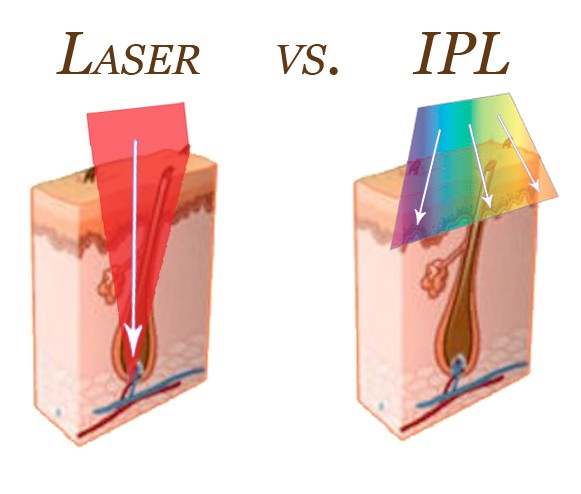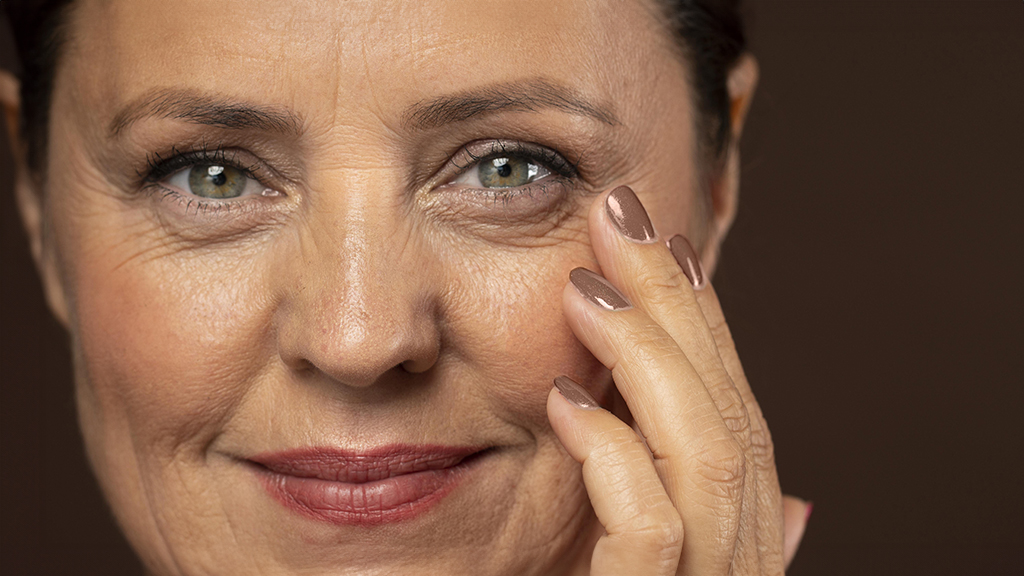Laser vs Intense Pulsed Light (IPL) Hair Removal: Understanding the Differences

As a patient, trying to understand the differences between Laser and IPL for hair removal and deciding which method is right for you can be very confusing due to the general absence of sound advice and intelligible technical details.
This page attempts to explain in a succinct form both the technical differences between Laser and IPL treatments and also to provide an insight into the business reasons as to why one form of treatment might be offered by a clinic in preference to another.
To begin with, you should know that both laser and IPL work on removing unwanted hair in essentially the same way. Both require that the region to be treated be shaved prior to the procedure, both convert light energy into heat energy which will heat up the hair follicle, prompting the bulb of the hair to fall out thus reducing hair growth. However this is where the similarity ends.
The main difference between Laser and IPL is the process by which the light is produced, the type of light (wavelength) and how well it is absorbed by the different hair and skin types.
IPL Hair Removal
An IPL produces varying wavelengths, which is types of light found on the visible light spectrum whereas Laser produces one single and precise wavelength, an intensely concentrated beam of light that is proven to target hair growth, so there is no ‘hit and miss’. This exact wavelength leads to a more effective treatment than IPL hair removal and therefore fewer treatments in the long term.
The advantage to the clinic for IPL is that many different skin types can be treated with one machine and they are much cheaper to manufacture but unfortunately the light is ‘one-size-fits-all’ in terms of its effectiveness on the hair.
However on the down-side it employs a diffused broad band of light in the visible spectrum, typically 550 to 1100 nanometers, whilst the optimum wavelengths for treating most hair types fall into the 700 to 850 nanometer range. Thus the light below 700 and above 850 is either ineffective or even putting the patient at risk of side effects if an incorrect energy level has been selected. It also means that more treatment sessions can be required to achieve a desired result. Furthermore IPL cannot be used on sun-exposed or darker skin, nor is it effective on all hair and skin types, thus making it less versatile than laser treatment. It can also cause damage to pigment producing cells, which can result in patches of darker or lighter skin.
Laser Hair Removal
The advantage of a Laser (single wavelength) is that the light is very targeted. There are many different types of laser of differing wavelengths for specific purposes, but each one is chosen for optimum effectiveness and safety for particular hair and skin types. The two most frequently used lasers employed in Laser Hair Removal are the Alexandrite Laser and the Nd:YAG Laser.
The Alexandrite Laser
The Alexandrite laser hair removal system typically employs a wavelength of 755nm which falls into the optimum range for hair removal so we are able to produce more effective results much faster than an IPL. This laser wavelength is absorbed mostly by the melanin and hair follicles rather than the surrounding tissues and it works by the laser beam passing safely through the skin targeting the melanin (pigment) in the hair, its energy is absorbed by the hair follicle and the heat created weakens or destroys the follicle preventing further growth. It is the quickest of all the currently available laser treatments. The best results of Alexandrite laser treatment are obtained on certain skin types which range from fair to middle-eastern. Alexandrite lasers can also be used on albino skin and skin with freckles, where many other hair removal systems are ineffective.
The disadvantage is that Asian or black skin cannot be treated with this type of Laser as the absorption of energy in the skin would be too high due to the high concentration of melanin in the skin.
However our Mixed technology laser system also includes Nd:YAG Laser which is suitable for darker skin types.
The Nd:YAG Laser
This Nd:YAG laser works at 1064nm. You may say: “but the optimum absorption for hair removal is 700-850nm”, that’s true, although the rate of absorption of light (effectiveness) reduces as the wavelength increases, it is not safe to use 700-850nm on darker skin. Fortunately, darker skin also has very dark hair which is typically black. Black hair will absorb energy very well at 1064nm to deliver a very effective result. Nd:YAG laser passes through the skin without targeting melanin, it works by directing the beam onto the base of the unwanted hair follicles where it disperses the energy and damages the follicle, reducing the rate at which it grows.
At Elite Plastic & Cosmetic Surgery Group, our Mixed Technology Grade 4 Medical laser system includes Alexandrite and Nd:YAG Lasers which safely and effectively treat all hair and skin types.
By using both the Alexandrite and Nd:YAG lasers separately and in combination, it enables us to treat the widest possible range of skin types, producing the optimum result for each patient whilst keeping discomfort and potential side-effects to a minimum.
Yet further adding to patient comfort and safety, we also use a unique advanced skin-cooling system which cools the skin before, during and after application of the laser without interfering with the laser beam. The result for the patient is an overall pain-free and safer experience, enabling the laser to work at higher efficiency and produce even better results.
Over time, many studies have been conducted comparing satisfaction level, the safety, and the effectiveness of IPL and Laser, specifically Nd:YAG and Alexandrite lasers, on various skin types and have come to the conclusion that laser outperforms IPL every time. Laser hair removal results in significantly longer hair-free intervals, a larger reduction in hair counts and greater patient satisfaction than the IPL.
From a purely commercial perspective, IPL systems are a significantly lower financial investment for clinics, with laser systems being much more expensive. Thus the price of IPL can often be cheaper for the patient. However it is important that when comparing the various clinics and their prices, patients should fully understand the differences between laser and IPL and that they compare like with like. The newest technologically advanced laser hair removal systems can significantly out-perform the results of IPL both in terms of the quality of result and overall safety.
At Elite Plastic & Cosmetic Surgery Group we put the interests of the patient first at all times, and because we are able to offer the best and latest in laser technology, combined with our years of experience as leading cosmetic surgery specialists, we are able to advise patients on precisely the best treatment in each individual case, with no compromise to our integrity or quality of the results resultant from purely commercial considerations.
For details about procedures and treatments or for a consultation, advice and prices from our Dubai clinic please call +971 4 431 2396 or use our online form.


